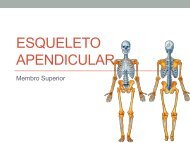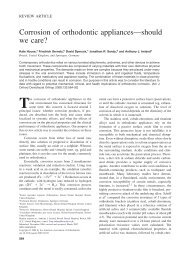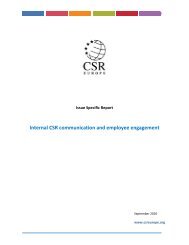Ethics in HCI - Molar
Ethics in HCI - Molar
Ethics in HCI - Molar
- TAGS
- ethics
- molar
- molar.crb.ucp.pt
Create successful ePaper yourself
Turn your PDF publications into a flip-book with our unique Google optimized e-Paper software.
• A usability test center enterta<strong>in</strong>s visitors by show<strong>in</strong>g<br />
video clips with “funny” episodes from usability tests<br />
where test participants are pick<strong>in</strong>g their noses, etc.<br />
Here are some more subtle examples:<br />
• Your usability studies show that a product is not<br />
usable. Market<strong>in</strong>g folks claim that it is really usable. Do<br />
you email the CEO and lay your job on the l<strong>in</strong>e?<br />
• You are aware that a product you are work<strong>in</strong>g on is<br />
us<strong>in</strong>g some technology that someone has patented<br />
(there are lots of GUI patents now). Do you make a<br />
st<strong>in</strong>k? Talk to your boss and ask him to talk to others?<br />
• You learn that your company wants to acquire a<br />
company for some GUI technology, but you know<br />
from read<strong>in</strong>g and review<strong>in</strong>g an evaluation copy of the<br />
product that the technology is really pretty poor and<br />
even unreliable. Do you make a st<strong>in</strong>k about this or let it<br />
pass until others discover they have wasted<br />
$10,000,000 on clunky technology that they will write<br />
off <strong>in</strong> less than a year?<br />
As <strong>HCI</strong> professionals we cannot deny responsibility for<br />
the products of our work. We cannot defer responsibility<br />
to the decision makers, the managers and bus<strong>in</strong>ess<br />
sponsors that def<strong>in</strong>e the objectives of the system. We are<br />
responsible for ensur<strong>in</strong>g that ethical issues <strong>in</strong> product<br />
development are discussed openly and not hidden away <strong>in</strong><br />
bureaucratic closets.<br />
FORMAT OF PANEL<br />
Our aim is to show the diversity of ethical problems <strong>in</strong><br />
<strong>HCI</strong> through examples that members of the audience can<br />
relate to, and to give attendees an experience they could not<br />
get by read<strong>in</strong>g articles or proceed<strong>in</strong>gs, or by surf<strong>in</strong>g the<br />
web.<br />
We will discuss real dilemmas that the panelists have faced<br />
dur<strong>in</strong>g their professional career although some details may<br />
have been changed to avoid identification of the<br />
<strong>in</strong>nocent/guilty.<br />
The panel will focus on dilemmas whose solutions are nontrivial<br />
and where substantial arguments can be presented<br />
both for and aga<strong>in</strong>st a particular action.<br />
Where appropriate, we will <strong>in</strong>volve all of the audience <strong>in</strong> a<br />
f<strong>in</strong>al “vote” where members of the audience will be able to<br />
show their personal op<strong>in</strong>ion on the dilemma by wav<strong>in</strong>g<br />
yellow or blue sheets of paper.<br />
Timetable:<br />
• Introduction to panel. The panel theme and format is<br />
briefly <strong>in</strong>troduced by the panel organizer. Panelists are<br />
briefly <strong>in</strong>troduced by the organizer us<strong>in</strong>g one slide per<br />
panelist (5 m<strong>in</strong>utes). The organizer takes a quick vote<br />
of the audience to see how many people are familiar<br />
with exist<strong>in</strong>g ethical guidel<strong>in</strong>es.<br />
• Presentation of dilemmas (5 dilemmas @ 15 m<strong>in</strong>utes).<br />
Each panelist will present one dilemma us<strong>in</strong>g one or<br />
two slides. The presentation will be followed by a brief<br />
discussion where one or two other panelists contribute<br />
their op<strong>in</strong>ion. We will then allow for comments from<br />
the audience and take a quick vote to survey the<br />
attitude of the audience.<br />
• Conclud<strong>in</strong>g remarks from the panelists (10 m<strong>in</strong>utes)<br />
Some of the panelists will have extra dilemmas ready for<br />
discussion if time permits.<br />
ETHICAL DILEMMAS<br />
Brenda Laurel<br />
Dilemma 1: Your client wants to build an <strong>in</strong>clusive onl<strong>in</strong>e<br />
community. Your research shows that strong, coherent<br />
communities <strong>in</strong>variably possess means for the group to set<br />
boundaries and exclude some people from membership. Do<br />
you argue that the client needs to provide for exclusion and<br />
boundary-sett<strong>in</strong>g <strong>in</strong> order to make its onl<strong>in</strong>e community<br />
successful?<br />
Yes: It is usually a better design decision to accommodate<br />
human characteristics than to try to change them.<br />
This particular need for boundary-sett<strong>in</strong>g by<br />
communities is so strong that ignor<strong>in</strong>g it will <strong>in</strong>sure<br />
failure.<br />
No: The desire to exclude is part of the dark side of<br />
human nature. A humanistic approach seeks to<br />
improve human character. The client can make an<br />
<strong>in</strong>clusive community so attractive that it will override<br />
exclusionary impulses.<br />
Dilemma 2: Your client asks you to determ<strong>in</strong>e through<br />
user test<strong>in</strong>g an optimal shooter <strong>in</strong>terface for an onl<strong>in</strong>e game<br />
targeted to teens and adults. In the design of your research,<br />
you have the opportunity to def<strong>in</strong>e the “optimal” <strong>in</strong>terface<br />
as productive of pleasure and excitement, or as a realistic<br />
representation of do<strong>in</strong>g violent harm to another person. Do<br />
you choose pleasure over realism?<br />
Yes: The clients wants a game, not a simulation. Everyone<br />
knows that shooter games are not the same as reality,<br />
and they should not be measured by the same<br />
standards.<br />
CHI2001 Panel Proposal Page 3 <strong>Ethics</strong> <strong>in</strong> <strong>HCI</strong>










